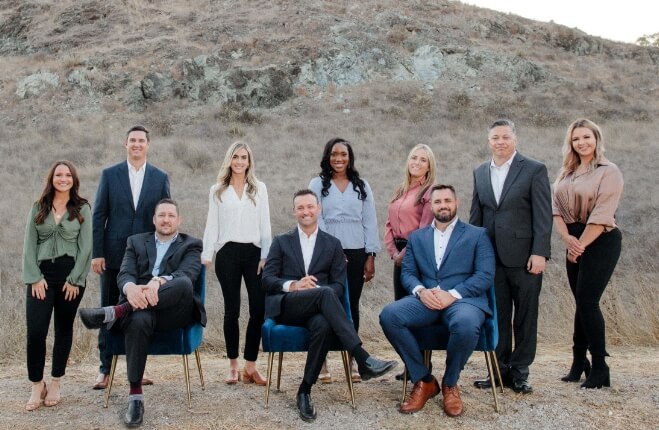

We’re here to be an extension of your family, advocating for you within the legal, insurance, and medical systems so you can focus on what matters most.
Three of the five siblings in our family—Robert May, Garrett May, and Cameron May—started this personal injury law firm because we wanted to give you the same service we’d want for our own family.
The May siblings with their respective families:
Left: Garrett May and family
Below: Robert May’s family
Bottom: Cameron May and his family

Early in his life, Robert was the victim of a heinous, violent personal injury and had to navigate the legal system as a plaintiff when he was a teenager. This is why our personal injury attorneys fight for you like family.


Your physical safety and healing come first. We have cultivated an extensive network of doctors who will care for you immediately, even if you can’t afford to pay. They trust us so strongly that they’ve agreed to defer their payment until we win your case. It’s crucial that you get the care you need immediately, not only for your own healing but also to establish an immediate record of the medical attention you needed as a result of your injury.

“The May Firm was very informative and hands on with my case. Everyone here was a huge help to me, and I appreciate everything they did.”

“Robert, Cameron, and his staff are great. From day one, the expectations were explained, and updates were always provided. Robert put me at ease by reassuring me the case would be handled appropriately from beginning to end. I give him and his staff credit for the quick resolve to my case.”
You have much more important things to do right now than worry about a bunch of details around your case. We act like your “caring concierge,” guiding you through all the detailed steps of dealing with the insurance companies and all the doctors and experts around the case. We work HARD so that it’s EASY for you.
You will come away from this case with more in your pocket than we do. We’ve never heard of another firm that makes this guarantee. If you’re like most prospective clients, you’re afraid your lawyer is going to pocket a huge sum from your case while you walk away with peanuts. We will never allow that. We always make sure that after your medical expenses are paid, you walk away with more than we do—even if we have to lower our fees to achieve that. It’s just the right thing to do: making sure YOU come FIRST.

“If I ever need a lawyer again, I’m calling the May Firm. I was rear ended and had a ton of bills. They told me what my rights were and that they would take care of me. All I had to do was get to physical therapy. They did everything, and I ended up with a very nice settlement and a new car. Thank you! You exceeded my expectations!”

“Rob and Cameron are genuine people who helped me feel genuinely cared for. I appreciate their work and recommend them to others.”
We’ll tell you exactly what we think the prospects for your case are, what you should expect to win, and how long it will take. We will never “talk up” your case to you just to get your business. We want to earn your business based on honesty and real talk, not fluff.
You can reach us any time and any way. Call, text, or email 24/7—and you’ll always have an answer. You’ll never get “lost in the shuffle” as with so many high-volume, high-turnover law firms.

“I feel that when I first called, you guys were all over it. You actually drove to Paso Robles, which was huge at the time. You guys were great at communicating with me through the whole process. Thank you.”

“Rob May and his team achieved over and above what I ever anticipated. I am thankful I found them, and I hold them in the highest esteem. Should you ever need a conscientious and diligent personal injury lawyer, I strongly recommend Robert May. He’s awesome. Thanks, guys, for your patience and professionalism. You rock!”
Our 99% success rate speaks for itself. We win because we care—and part of the way we care for you is through winning for you. When we take on your case, we expect to win because we fight to win.

"*" indicates required fields
We Have a
99%
Success
Rate
Here are the STORIES Behind the Success…
Medical insurance
“It was such a relief to have [the May Firm] in my corner. The
insurance companies started calling me back with offers.”

At a young age, Robert May learned just how devastating it is to feel unsafe around those who should have protected you. A personal calamity as a teenager helped him learn how lawyers standing up for you in court can restore a sense of safety and trust in your life.
GET ANSWERS AND PEACE OF MIND NOW:
Tell us what happened (866) 619-6704
California Personal Injury Lawyers
WE SERVICE ALL OF CALIFORNIA